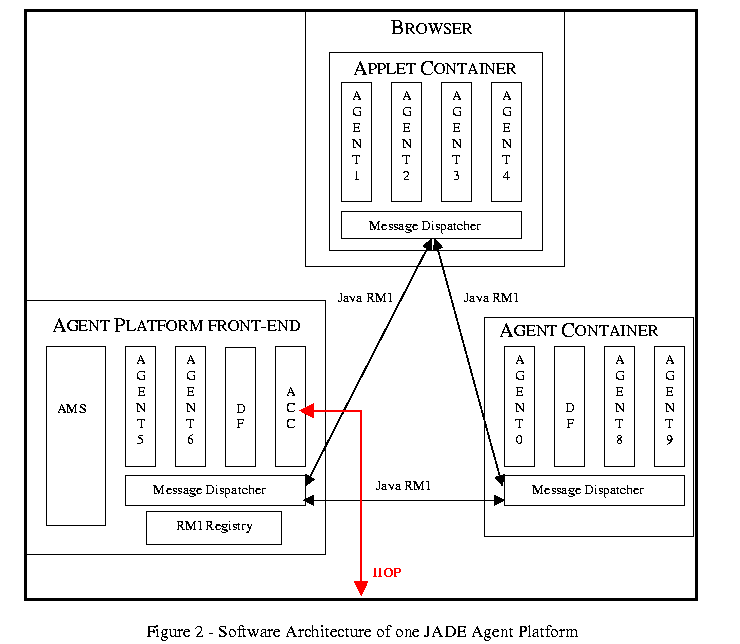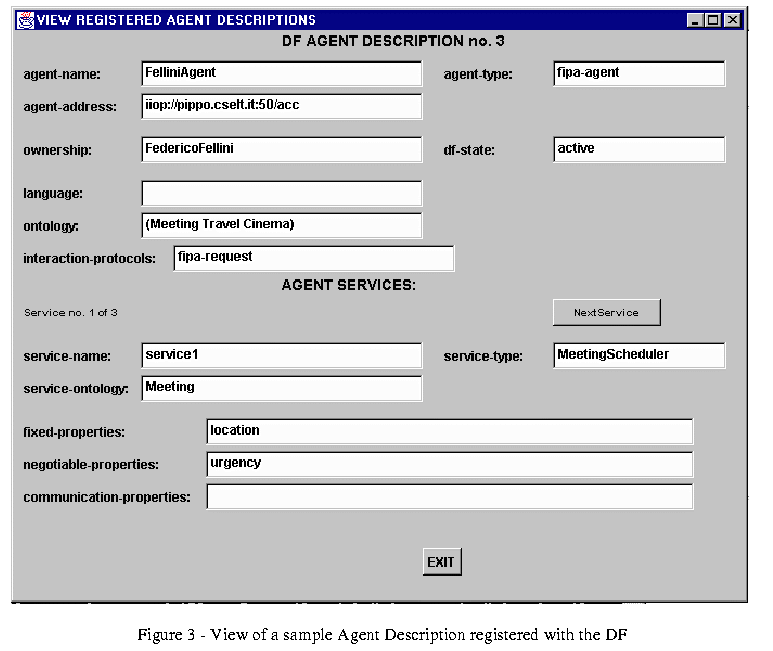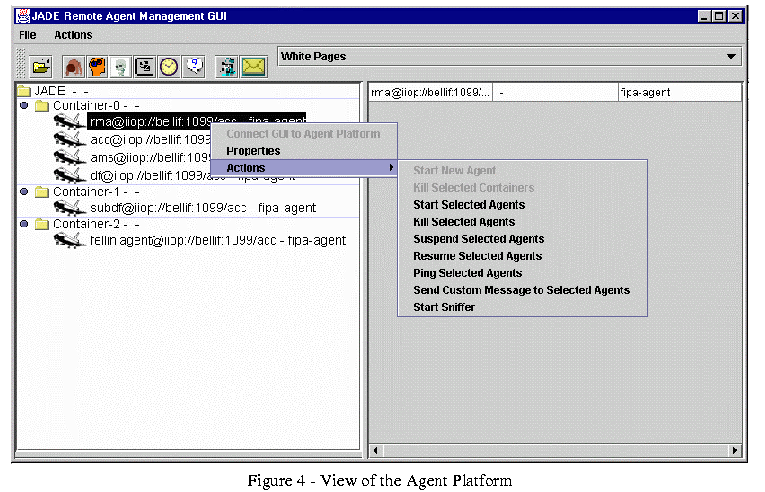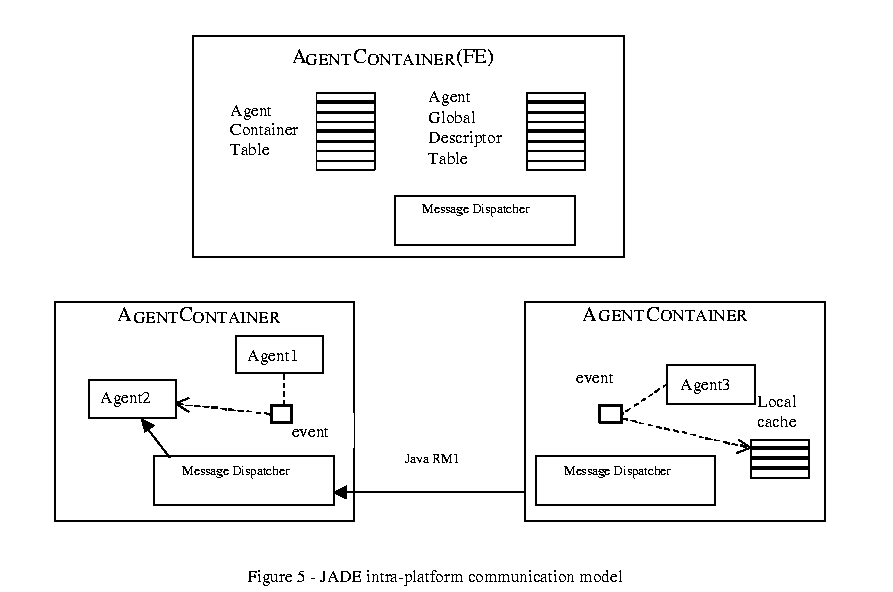JADE
This talk summarizes material from:
1 Introduction
- The Java DEvelopment Framework (JADE) is a FIPA-compliant
agent framework.
- It is being developed by a group at CSELT S.p.A. (now TILab) and the University of Parma.
- JADETM is a trademark registered by TILab.
- They have a homepage at http://sharon.cselt.it/projects/jade/ [5].
- Version 2.6 came on 19 July 2002.
2 Features
- FIPA-compliant AMS, DF, and ACC.
- Many DFs can be used. Many domains can be implemented.
- Simplified API for using many DFs.
- Simple API for sending/receiving messages.
- FIPA97-compliant IIOP protocol for communicating with
different platforms. A JADE agent can talk to a FIPA-OS agent,
and viz.
- Messages sent and received within a host stay there (like CORBA does).
- Library of FIPA IPs.
- GUI for managing agents.
3 Architecture
- One, and only one, JVM on each host is needed.
- Communications between JVMs is done using RMI.
- Within a JVM objects are simply moved (more later).
- Outside of JADE, communications uses IIOP.
- The agent container is an RMI server object that manages a
set of agents. Each agent gets one thread. The agent container
handles the routing of messages.
- The agent platform provides a GUI for the remote management,
monitoring and controlling of the status of agents. This GUI is
implemented as an agent, the Remote Monitoring Agent (RMA).
4 GUI
5 Communications
- When a new platform front-end starts it creates an internal
RMI registry on the current host, as well as the ACC, AMS, and
DF.
- When a new container starts it looks up the RMI registry and
gets the platform front-end object reference.
- When an agent sends a message, three things are possible.
- If receiver is on same container then pass ACL message using event object.
- If receiver is on same platform but different container then ACL message is sent using RMI.
- If receiver is on different platform then IIOP protocol
is used, as per FIPA standard. The ACL message is
transformed into a character string and the remote
invocation is done using IIOP.
6 ACLMessage Class
- There is an
ACLMessage class which encapsulates the ACL message.
- In order to send a message, you first create an
ACLMessage object and then populate it.
- It has all the get/set pairs you need.
- It has a
createReply method which will create a
reply to the message (setting the :in-reply-to field).
7 Agent Execution
- An agent is created by extending the
Agent
class, implementing various behaviors which are descendats of
Behavior, then instantiating them and adding them
to the agent once it starts up.
- The calls are
addBehavior and removeBehavior.
- There is one thread per agent.
- Within an agent the behaviors use cooperative
multitasking. That is, one behavior must give up control before
the next one can start. This was used to avoid synchronized
methods which (they claim) are 100 times slower.
8 Writing your Agent
- You write a class that extends
Agent.
- Overrite
setup(). You must add the behaviors
you want your agent to have, use addBehavior.
- Override
takeDown() with your code for shutting
down nicely (unregister with DF).
- Each behavior you define will get called in the
action method to do its thing. It should execute
quickly (cooperative multitasking).
- Afterwards, the scheduler will can
done to
check if the behavior should be removed.
- Two other Behavior methods--
onStart and
onEnd--also get called at the obvious times.
- You need to fetch any waiting messages yourself from the
message queue. You can do so with a blocking
blockingReceive or non-blocking
receive call.
- You can also use the
MessageTemplate class
to fetch messages that match a particular pattern from the
queue.
9 Ping Agent
import java.util.Date;
import java.io.FileWriter;
import java.io.IOException;
import java.io.PrintWriter;
import java.io.OutputStreamWriter;
import jade.core.*;
import jade.core.behaviours.*;
import jade.lang.acl.ACLMessage;
import jade.domain.FIPAAgentManagement.ServiceDescription;
import jade.domain.FIPAAgentManagement.DFAgentDescription;
import jade.domain.DFService;
import jade.domain.FIPAException;
/**
This agent implements a simple Ping Agent for the AgentCities project.
First of all the agent registers itself with the DF of the platform and
then waits for ACLMessages.
If a QUERY_REF message arrives that contains the string "ping" within the content
then it replies with an INFORM message whose content will be the string "alive".
If it receives a NOT_UNDERSTOOD message no reply is sent.
For any other message received it replies with a NOT_UNDERSTOOD message.
The exchanged message are written in a log file whose name is the local name of the agent.
@author Tiziana Trucco - CSELT S.p.A.
@version $Date: 2002/01/31 09:58:40 $ $Revision: 1.4 $
*/
public class PingAgent extends Agent {
PrintWriter logFile;
class WaitPingAndReplyBehaviour extends SimpleBehaviour {
private boolean finished = false;
public WaitPingAndReplyBehaviour(Agent a) {
super(a);
}
public void action() {
ACLMessage msg = blockingReceive();
if(msg != null){
if(msg.getPerformative() == ACLMessage.NOT_UNDERSTOOD)
{
log("Received the following message: "+ msg.toString());
log("No reply message sent.");
}
else{
log("Received the following message: "+ msg.toString());
ACLMessage reply = msg.createReply();
if(msg.getPerformative()== ACLMessage.QUERY_REF)
{
String content = msg.getContent();
if ((content != null) && (content.indexOf("ping") != -1))
{
reply.setPerformative(ACLMessage.INFORM);
reply.setContent("alive");
}
else
{
reply.setPerformative(ACLMessage.NOT_UNDERSTOOD);
reply.setContent("( UnexpectedContent (expected ping))");
}
}
else
{
reply.setPerformative(ACLMessage.NOT_UNDERSTOOD);
reply.setContent("( (Unexpected-act "+ACLMessage.getPerformative(msg.getPerformative())+") ( expected (query-ref :content ping)))");
}
log("Replied with the following message: "+ reply.toString());
send(reply);
}
}else{
}
}
public boolean done() {
return finished;
}
}
protected void setup() {
/** Registration with the DF */
DFAgentDescription dfd = new DFAgentDescription();
ServiceDescription sd = new ServiceDescription();
sd.setType("AgentcitiesPingAgent");
sd.setName(getName());
sd.setOwnership("TILAB");
dfd.setName(getAID());
dfd.addServices(sd);
try {
DFService.register(this,dfd);
} catch (FIPAException e) {
System.err.println(getLocalName()+" registration with DF unsucceeded. Reason: "+e.getMessage());
doDelete();
}
try{
logFile = new PrintWriter(new FileWriter(getLocalName()+".txt",true));
log("Agent: " + getName() + " born");
WaitPingAndReplyBehaviour PingBehaviour = new WaitPingAndReplyBehaviour(this);
addBehaviour(PingBehaviour);
}catch(IOException e){
System.out.println("WARNING: The agent needs the "+ getLocalName()+".txt file.");
e.printStackTrace();
}
}
public synchronized void log(String str) {
logFile.println((new Date()).toString()+ " - " + str);
logFile.flush();
}
}
10 ComplexBehaviourAgent
package examples.behaviours;
import jade.core.Agent;
import jade.core.behaviours.OneShotBehaviour;
import jade.core.behaviours.SequentialBehaviour;
import jade.core.behaviours.Behaviour;
/**
This is an example of recursive aggregation of composite agent behaviours.
A composite behaviour is created, composed of some Sequential Behaviours,
and OneShot behaviours.
@author Giovanni Rimassa - Università di Parma
@version $Date: 2001/08/06 14:10:07 $ $Revision: 2.2 $
*/
public class ComplexBehaviourAgent extends Agent {
class Behaviour3Step extends OneShotBehaviour {
private String myCode;
public Behaviour3Step(Agent a, String code) {
super(a);
myCode = code;
}
public void action() {
System.out.println("Agent " + getName() + ": Step " + myCode);
}
}
protected void setup() {
SequentialBehaviour myBehaviour1 = new SequentialBehaviour(this) {
public int onEnd() {
reset();
return super.onEnd();
}
};
SequentialBehaviour myBehaviour2 = new SequentialBehaviour(this);
SequentialBehaviour myBehaviour2_1 = new SequentialBehaviour(this);
SequentialBehaviour myBehaviour2_2 = new SequentialBehaviour(this);
myBehaviour2_1.addSubBehaviour(new Behaviour3Step(this,"2.1.1"));
myBehaviour2_1.addSubBehaviour(new Behaviour3Step(this,"2.1.2"));
myBehaviour2_1.addSubBehaviour(new Behaviour3Step(this,"2.1.3"));
myBehaviour2_2.addSubBehaviour(new Behaviour3Step(this,"2.2.1"));
myBehaviour2_2.addSubBehaviour(new Behaviour3Step(this,"2.2.2"));
Behaviour b = new Behaviour3Step(this,"2.2.3");
myBehaviour2_2.addSubBehaviour(b);
myBehaviour1.addSubBehaviour(new Behaviour3Step(this,"1.1"));
myBehaviour1.addSubBehaviour(new Behaviour3Step(this,"1.2"));
myBehaviour1.addSubBehaviour(new Behaviour3Step(this,"1.3"));
myBehaviour2.addSubBehaviour(myBehaviour2_1);
myBehaviour2.addSubBehaviour(myBehaviour2_2);
myBehaviour2.addSubBehaviour(new Behaviour3Step(this,"2.3"));
myBehaviour2.addSubBehaviour(new Behaviour3Step(this,"2.4"));
myBehaviour2.addSubBehaviour(new Behaviour3Step(this,"2.5"));
addBehaviour(myBehaviour1);
addBehaviour(myBehaviour2);
}
}
11 Agents with a GUI
- Because of the event model used by JADE special care must be
taken when implementing GUI agents.
- To do so, you should extend
GuiAgent.
- You should then define the types of events you want to
receive and implement the
onGUIEvent method.
11.1 GUI Agent Example
package examples.mobile;
import java.util.Vector;
import java.awt.*;
import java.awt.event.*;
import javax.swing.*;
import java.util.Iterator;
import jade.core.*;
import jade.core.behaviours.*;
import jade.domain.mobility.*;
import jade.domain.FIPANames;
import jade.content.lang.Codec;
import jade.content.lang.sl.SLCodec;
import jade.gui.GuiAgent;
import jade.gui.GuiEvent;
import jade.lang.acl.ACLMessage;
import jade.lang.acl.MessageTemplate;
/**
This is an example of mobile agent. This class contains the resources
used by the agent behaviours: the counter, the flag cntEnabled, and
the list of visited locations. At the setup it creates a gui and adds
behaviours to: get the list of available locations from AMS, serve the
incoming messages, and to increment the counter. In particular, notice
the usage of the two methods <code>beforeMove()</code> and
<code>afterMove()</code> to execute some application-specific tasks
just before and just after the agent migration takes effect.
Because this agent has a GUI, it extends the class GuiAgent that, in turn,
extends the class Agent. Being the GUI a different thread, the communication
between the agent and its GUI is based on event passing.
@see jade.gui.GuiAgent
@author Giovanni Caire - CSELT S.p.A
@version $Date: 2002/07/18 00:22:29 $ $Revision: 2.9 $
*/
public class MobileAgent extends GuiAgent {
int cnt; public boolean cntEnabled; transient protected MobileAgentGui gui; Location nextSite;
public static final int EXIT = 1000;
public static final int MOVE_EVENT = 1001;
public static final int STOP_EVENT = 1002;
public static final int CONTINUE_EVENT = 1003;
public static final int REFRESH_EVENT = 1004;
public static final int CLONE_EVENT = 1005;
Vector visitedLocations = new Vector();
public void setup() {
getContentManager().registerLanguage(new SLCodec(), FIPANames.ContentLanguage.FIPA_SL0);
getContentManager().registerOntology(MobilityOntology.getInstance());
gui = new MobileAgentGui(this);
gui.setVisible(true);
addBehaviour(new GetAvailableLocationsBehaviour(this));
cnt = 0;
cntEnabled = true;
Behaviour b1 = new CounterBehaviour(this);
addBehaviour(b1);
Behaviour b2 = new ServeIncomingMessagesBehaviour(this);
addBehaviour(b2);
}
public void takeDown() {
if (gui!=null) {
gui.dispose();
gui.setVisible(false);
}
System.out.println(getLocalName()+" is now shutting down.");
}
/**
* This method stops the counter by disabling the flag
*/
void stopCounter(){
cntEnabled = false;
}
/**
* This method resume counting by enabling the flag
*/
void continueCounter(){
cntEnabled = true;
}
/**
* This method displays the counter in the GUI
*/
void displayCounter(){
gui.displayCounter(cnt);
}
protected void beforeClone() {
System.out.println(getLocalName()+" is now cloning itself.");
}
protected void afterClone() {
System.out.println(getLocalName()+" has cloned itself.");
afterMove();
}
/**
* This method is executed just before moving the agent to another
* location. It is automatically called by the JADE framework.
* It disposes the GUI and prints a bye message on the standard output.
*/
protected void beforeMove()
{
gui.dispose();
gui.setVisible(false);
System.out.println(getLocalName()+" is now moving elsewhere.");
}
/**
* This method is executed as soon as the agent arrives to the new
* destination.
* It creates a new GUI and sets the list of visited locations and
* the list of available locations (via the behaviour) in the GUI.
*/
protected void afterMove() {
System.out.println(getLocalName()+" is just arrived to this location.");
gui = new MobileAgentGui(this);
if(nextSite != null)
{
visitedLocations.addElement(nextSite);
for (int i=0; i<visitedLocations.size(); i++)
gui.addVisitedSite((Location)visitedLocations.elementAt(i));
}
gui.setVisible(true);
getContentManager().registerLanguage(new SLCodec(), FIPANames.ContentLanguage.FIPA_SL0);
getContentManager().registerOntology(MobilityOntology.getInstance());
addBehaviour(new GetAvailableLocationsBehaviour(this));
}
protected void onGuiEvent(GuiEvent ev)
{
switch(ev.getType())
{
case EXIT:
gui.dispose();
gui = null;
doDelete();
break;
case MOVE_EVENT:
Iterator moveParameters = ev.getAllParameter();
nextSite =(Location)moveParameters.next();
doMove(nextSite);
break;
case CLONE_EVENT:
Iterator cloneParameters = ev.getAllParameter();
nextSite =(Location)cloneParameters.next();
doClone(nextSite,"clone"+cnt+"of"+getName());
break;
case STOP_EVENT:
stopCounter();
break;
case CONTINUE_EVENT:
continueCounter();
break;
case REFRESH_EVENT:
addBehaviour(new GetAvailableLocationsBehaviour(this));
break;
}
}
}
12 Interaction Protocols
- JADE implements FIPA IPs by defining classes that extend Behavior.
- For each IP there are two classes, one for the
Initiator role and one for the Responder
role.
- They are all in the
jade.proto package.
- All Initiator behaviors terminate and are removed when they
reach their final state.
- All Responder behaviors are cyclic. They are rescheduled as
soon as they reach a final state. This means that if you want N
concurrent conversations you will need to add N instances of the
behavior.
12.1 Initiator
package examples.protocols;
import java.io.*;
import jade.core.*;
import jade.core.behaviours.*;
import jade.proto.*;
import jade.lang.acl.*;
import jade.domain.FIPAAgentManagement.*;
import java.util.Vector;
import java.util.Enumeration;
/**
* This example shows an agent performing the role of the initiator of
a FIPARequest of FIPAQuery protocol.
* It sends random one of the following performatives:
* <ul>
* <li> REQUEST <code>ACLMessage</code> to start a FIPA request protocol
* <li> QUERY-IF or QUERY-REF <code>ACLMessage</code> to start a FIPA Query protocol.
* </ul>
* The user must pass as arguements to the initiator agent the local
names of the responder agents otherwise the agent exits.
* This example show how a initiator role of a FIPARequest or
FIPAQuery protocol can be realized using the
* <code>AchiveREInitiator</code> behaviour.
* @see jade.proto.AchieveREInitiator
* @see jade.proto.AchiveREResponder
* @author Tiziana Trucco - Telecom Italia Lab S.p.A
* @version $Date: 2001/09/18 12:26:17 $ $Revision: 1.4 $
**/
public class Initiator extends Agent {
/**
Creare a new ACLMessage to start a protocol.
**/
ACLMessage createNewMessage(){
ACLMessage messageToSend = new ACLMessage(ACLMessage.NOT_UNDERSTOOD);
double chance = Math.random();
double range = 1.0/3.0;
Object[] receivers = getArguments();
if(receivers == null || receivers.length == 0){
System.out.println( "ERROR: No responders passed as arguments. To run this example launch some responders and pas its local names as argument to the initiator agent" );
System.exit(0);
}else{
for (int i=0; i<receivers.length; i++)
messageToSend.addReceiver(new AID((String)receivers[i],false));
}
long timeout = System.currentTimeMillis() + 10000;
messageToSend.setReplyByDate(new java.util.Date(timeout));
if (chance <range)
{ messageToSend.setPerformative(ACLMessage.REQUEST);
messageToSend.setProtocol(jade.proto.FIPAProtocolNames.FIPA_REQUEST);
}else if(chance < (range * 2)){
messageToSend.setPerformative(ACLMessage.QUERY_REF);
messageToSend.setProtocol(jade.proto.FIPAProtocolNames.FIPA_QUERY);
System.out.println("Initiator is sending a Query-Ref message");
}else {
messageToSend.setPerformative(ACLMessage.QUERY_IF);
messageToSend.setProtocol(jade.proto.FIPAProtocolNames.FIPA_QUERY);
System.out.println("Initiator is sending a Query-If message");
}
System.out.println(getLocalName()+" is sending a "+ACLMessage.getPerformative(messageToSend.getPerformative())+" message to initiate the protocol");
return messageToSend;
}
public void setup() {
Behaviour b;
ACLMessage request = createNewMessage();
b = new MyInitiator(this, request, true);
addBehaviour(b);
}
/**
Inner class MyInitiator
*/
class MyInitiator extends AchieveREInitiator {
boolean restartOnEnd;
/**
* @param req the ACLMessage to be sent in order to initiate the protocol
* @param restartOnEnd if true the behaviour is reset and readded
* to the agent queue of behaviours as soon as it terminates. Take
* care becuase this might cause an infinite loop.
*
**/
public MyInitiator(Agent a, ACLMessage req, boolean restartOnEnd) {
super(a, req);
this.restartOnEnd = restartOnEnd;
}
protected void handleAgree(ACLMessage agree) {
System.out.println(myAgent.getLocalName()+ " in handleAgree: " + agree);
}
protected void handleRefuse(ACLMessage refuse) {
System.out.println(myAgent.getLocalName()+ " in handleRefuse: " + refuse);
}
protected void handleFailure(ACLMessage failure) {
System.out.println(myAgent.getLocalName()+ " in handleFailure: " + failure);
}
protected void handleNotUnderstood(ACLMessage notUnderstood) {
System.out.println(myAgent.getLocalName()+ " in handleNotUnderstood: " + notUnderstood);
}
protected void handleInform(ACLMessage inform) {
System.out.println(myAgent.getLocalName()+ " in handleInform: " + inform);
}
protected void handleAllResponses(Vector allResponses) {
System.out.print(myAgent.getLocalName()+ " in handleAllResponses: ");
for (Enumeration it = allResponses.elements(); it.hasMoreElements(); ) {
ACLMessage rsp = (ACLMessage) it.nextElement();
System.out.print(ACLMessage.getPerformative(rsp.getPerformative())+" ");
}
System.out.println();
}
protected void handleAllResultNotifications(Vector allResultNotifications) {
System.out.println(myAgent.getLocalName()+ " in handleAllResultNotifications: ");
for (Enumeration it = allResultNotifications.elements(); it.hasMoreElements(); ) {
ACLMessage rsp = (ACLMessage) it.nextElement();
System.out.print(ACLMessage.getPerformative(rsp.getPerformative())+" ");
}
System.out.println();
}
protected void handleOutOfSequence(ACLMessage msg){
System.out.println(myAgent.getLocalName()+ " in handleOutOfSequence: " + msg);
}
protected Vector prepareRequests(ACLMessage msg) {
Vector l = super.prepareRequests(msg);
if (l.size() == 0) l.addElement(createNewMessage());
return l;
}
public int onEnd(){
try{
if (restartOnEnd) {
System.out.println("\nPress a Key to repeat the protocol: ");
BufferedReader buff = new BufferedReader(new InputStreamReader(System.in));
String reply = buff.readLine();
reset(createNewMessage());
myAgent.addBehaviour(this);
}
}catch(Exception e){
e.printStackTrace();
}
return super.onEnd();
}
}
}
12.2 Responder
package examples.protocols;
import jade.core.*;
import jade.core.behaviours.*;
import jade.proto.*;
import jade.lang.acl.*;
import jade.domain.FIPAAgentManagement.*;
import java.io.*;
/**
* This agent acts as a responder for the FIPARequest and FIPAQuery protocol
* The example shows how to write two simple the FIPARequest protocol
and the FIPAQuery Protocol
using the <code>AchiveREResponder<code> behaviour.
* If a REQUEST message arrives the agent could reply in one of the following way:
<UL>
* <li> send an AGREE message and then an INFORM message
* <li> send an AGREE message and then a FAILURE message
* <li> send an AGREE message and then no message
* <li> send an AGREE message and then an out of sequence message
* <li> send an INFORM message
* <li> send a REFUSE message
* <li> send a NOT_UNDERSTOD message
* <li> send an out of sequence message
* <li> send no message
* </ul>
* If QUERY-IF or QUERY-REF message arrive the agent could reply in one of the following way:
* <ul>
* <li> send a NOT_UNDERSTOOD message
* <li> send a REFUSE message
* <li> send a FAILURE message
* <li> send an INFORM message
* <li> send an out of sequence message
* <li> send no message
* </ul>
* This agent can be use together with an <code>Initiator</code> agent to see an agent conversation
* using random the FIPARequest or FIPAQuery protocol.
*
* @see jade.proto.AchieveREInitiator
* @see jade.proto.AchieveREResponder
* @author Tiziana Trucco - Telecom Italia Lab S.p.A
* @version $Date: 2001/09/18 10:28:32 $ $Revision: 1.3 $
**/
public class Responder extends Agent {
public void setup() {
Behaviour requestB = new MyRequestResponder(this, AchieveREResponder.createMessageTemplate(FIPAProtocolNames.FIPA_REQUEST));
addBehaviour(requestB);
Behaviour queryB = new MyRequestResponder(this,AchieveREResponder.createMessageTemplate(FIPAProtocolNames.FIPA_QUERY));
addBehaviour(queryB);
}
/**
Inner class MyRequestResponder
*/
class MyRequestResponder extends AchieveREResponder {
boolean sentAgree = false;
public MyRequestResponder(Agent a, MessageTemplate mt) {
super(a, mt, null);
}
protected ACLMessage prepareResponse(ACLMessage request) throws RefuseException, NotUnderstoodException {
sentAgree=false;
double chance = Math.random();
double range = 1.0 / 6.0;
ACLMessage response = request.createReply();
if(chance < range ){
response.setPerformative(ACLMessage.NOT_UNDERSTOOD);
}else if(chance <(range * 2.0)){
response.setPerformative(ACLMessage.REFUSE);
}else if (chance < (range * 3.0)){
response.setPerformative(ACLMessage.AGREE);
sentAgree = true;
}else if (chance < (range * 4.0)){
response.setPerformative(ACLMessage.SUBSCRIBE);
}else if(chance <(range * 5.0)){
response.setPerformative(ACLMessage.INFORM);
}else{
response = null;
}
System.out.println( myAgent.getLocalName() + " --> is sending "+(response==null?"no":(response.getPerformative()==ACLMessage.SUBSCRIBE?"an out-of-sequence":ACLMessage.getPerformative(response.getPerformative())))+ " response to the protocol initiator." );
return response;
}
protected ACLMessage prepareResultNotification(ACLMessage request, ACLMessage response) throws FailureException {
double chance = Math.random();
ACLMessage resNot = request.createReply();
if(sentAgree){
if(chance < 0.25){
resNot.setPerformative(ACLMessage.INFORM);
}else if(chance < 0.50){
resNot.setPerformative(ACLMessage.FAILURE);
}else if(chance < 0.75){
resNot.setPerformative(ACLMessage.SUBSCRIBE);
myAgent.addBehaviour(new unblockInitiator(myAgent,resNot));
}else{
myAgent.addBehaviour(new unblockInitiator(myAgent,resNot));
resNot = null;
}
}else {
resNot = null;
}
System.out.println( myAgent.getLocalName() + " --> is sending "+(resNot==null?"no":(resNot.getPerformative()==ACLMessage.SUBSCRIBE?"an out-of-sequence":ACLMessage.getPerformative(resNot.getPerformative())))+ " result notification to the protocol initiator." );
return resNot;
}
}
/**
* This inner class is a behaviour that waits until the user presses a
* key and then sends a message
**/
class unblockInitiator extends OneShotBehaviour {
ACLMessage msg;
unblockInitiator(Agent a, ACLMessage msg) {
super(a);
this.msg=msg;
}
public void action() {
System.out.println(myAgent.getLocalName() + ": This situation causes the initiator to block forever; when you are tired of waiting, press a key and a FAILURE message will be sent to unblock the initiator ...");
try {
BufferedReader buff = new BufferedReader(new InputStreamReader(System.in));
String reply = buff.readLine();
} catch (IOException e) {
e.printStackTrace();
}
msg.setPerformative(ACLMessage.FAILURE);
myAgent.send(msg);
}
}
}
13 Ontology Support
13.1 Content Reference Model
- Predicates are expressions that say something about
the world. They evaluate to true or false.
- Terms are expressions identifying entities
(abstract or concrete) that exist in the world and that agents
talk and reason about.
- Concepts expressions that indicate entities
with a complex structure that can be defined in terms of
slots
- Agent actions special concepts that indicate
actions that can be performed by some agents
- Primitives expressions that indicate atomic
entities such as strings and integers.
- Aggregates expressions indicating entities that
are groups of other entities
- Identifying Referential Expressions expressions
that identify the entity (or entities) for which a given
predicate is true
- Variables expressions (typically used in
queries) that indicate a generic element not known
apriori.
13.2 Steps For Using Ontology Support
- Define an ontology including the schemas for the types of
predicate, agent action and concept that are pertinent to the
addressed domain.
- Develop proper Java classes for all types of predicate,
agent action and concept in the ontology.
- Selecting a suitable content language among those directly
supported by JADE. (use SL).
- Register the defined ontology and the selected content
language for the agent.
- Create and handle content expressions as Java objects that
are instances of the classes developed in (2) and let JADE
translate these Java objects to/from strings or sequences of
bytes that fit the
content slot of
ACLMessages.
13.3 MusicShopOntology
package examples.content.musicShopOntology;
import jade.content.onto.*;
import jade.content.schema.*;
import jade.content.schema.facets.*;
import examples.content.ecommerceOntology.*;
/**
* Ontology containing music related concepts.
* @author Giovanni Caire - TILAB
*/
public class MusicShopOntology extends Ontology implements MusicShopVocabulary {
public static final String ONTOLOGY_NAME = "Music-shop-ontology";
private static Ontology theInstance = new MusicShopOntology(ECommerceOntology.getInstance());
public static Ontology getInstance() {
return theInstance;
}
/**
* Constructor
*/
private MusicShopOntology(Ontology base) {
super(ONTOLOGY_NAME, base);
try {
add(new ConceptSchema(CD), CD.class);
add(new ConceptSchema(TRACK), Track.class);
add(new ConceptSchema(SINGLE), Single.class);
ConceptSchema cs = (ConceptSchema) getSchema(CD);
cs.addSuperSchema((ConceptSchema) getSchema(ECommerceOntology.ITEM));
cs.add(CD_TITLE, (PrimitiveSchema) getSchema(BasicOntology.STRING));
cs.add(CD_TRACKS, (ConceptSchema) getSchema(TRACK), 1, ObjectSchema.UNLIMITED);
cs = (ConceptSchema) getSchema(TRACK);
cs.add(TRACK_NAME, (TermSchema) getSchema(BasicOntology.STRING));
cs.add(TRACK_DURATION, (TermSchema) getSchema(BasicOntology.INTEGER), ObjectSchema.OPTIONAL);
cs.add(TRACK_PCM, (TermSchema) getSchema(BasicOntology.BYTE_SEQUENCE), ObjectSchema.OPTIONAL);
cs = (ConceptSchema) getSchema(SINGLE);
cs.addSuperSchema((ConceptSchema) getSchema(CD));
cs.addFacet(CD_TRACKS, new CardinalityFacet(2, 2));
}
catch (OntologyException oe) {
oe.printStackTrace();
}
}
}
13.4 Term Classes
package examples.content.musicShopOntology;
import jade.content.*;
import jade.util.leap.List;
import jade.util.leap.Iterator;
import examples.content.ecommerceOntology.*;
public class CD extends Item {
private String title = null;
private List tracks = null;
public String getTitle() {
return title;
}
public void setTitle(String t) {
title = t;
}
public List getTracks() {
return tracks;
}
public void setTracks(List l) {
tracks = l;
}
public String toString() {
StringBuffer sb = new StringBuffer(title);
if (tracks != null) {
Iterator it = tracks.iterator();
int i = 0;
while (it.hasNext()) {
sb.append(" ");
Track t = (Track) it.next();
sb.append("track-"+i+": "+t.toString());
i++;
}
}
return sb.toString();
}
}
package examples.content.musicShopOntology;
public class Single extends CD {
}
package examples.content.musicShopOntology;
import jade.content.*;
public class Track implements Concept {
private String name = null;
private Integer duration = null;
private byte[] pcm = null;
public String getName() {
return name;
}
public void setName(String name) {
this.name = name;
}
public Integer getDuration() {
return duration;
}
public void setDuration(Integer duration) {
this.duration = duration;
}
public byte[] getPcm() {
return pcm;
}
public void setPcm(byte[] pcm) {
this.pcm = pcm;
}
public String toString() {
return name+(duration != null ? ("["+duration.intValue()+" sec]") : "");
}
}
package examples.content.ecommerceOntology;
import jade.content.*;
import jade.core.AID;
public class Owns implements Predicate {
private AID owner;
private Item item;
public AID getOwner() {
return owner;
}
public void setOwner(AID id) {
owner = id;
}
public Item getItem() {
return item;
}
public void setItem(Item i) {
item = i;
}
}
13.5 CDTrader
package examples.content;
import jade.core.*;
import jade.core.behaviours.*;
import jade.lang.acl.ACLMessage;
import jade.lang.acl.MessageTemplate;
import jade.util.leap.List;
import jade.util.leap.ArrayList;
import jade.util.leap.Iterator;
import jade.content.*;
import jade.content.abs.*;
import jade.content.onto.*;
import jade.content.onto.basic.*;
import jade.content.lang.*;
import jade.content.lang.sl.*;
import examples.content.musicShopOntology.*;
import examples.content.ecommerceOntology.*;
import java.util.Date;
/**
This is an agent that plays at the same time the part of a seller of
CDs and a buyer of CDs.
More in details the conversation between the "seller" and the "buyer"
will go on as follows:
- "Seller" informs "buyer" that he owns a CD ("Synchronicity").
- "Buyer" asks for the price of that CD
- "Seller" informs "buyer" about the price
- "Buyer" requests "seller" to sell him the CD specifying his credit card
- "Seller" performs the action (this step is not actually implemented as
it would imply interacting with a delivery system like UPS and an
electronic payment system) and notifies "buyer"
*/
public class CDTrader extends Agent {
private ContentManager manager = (ContentManager) getContentManager();
private Codec codec = new SLCodec();
private Ontology ontology = MusicShopOntology.getInstance();
protected void setup() {
manager.registerLanguage(codec);
manager.registerOntology(ontology);
addBehaviour(new HandleInformBehaviour(this));
addBehaviour(new HandleQueryBehaviour(this));
addBehaviour(new HandleRequestBehaviour(this));
CD myCd = new CD();
myCd.setSerialID(123456);
myCd.setTitle("Synchronicity");
List tracks = new ArrayList();
Track t = new Track();
t.setName("Synchronicity");
tracks.add(t);
t = new Track();
t.setName("Every breath you take");
tracks.add(t);
t = new Track();
t.setName("King of pain");
t.setDuration(new Integer(240));
tracks.add(t);
myCd.setTracks(tracks);
addBehaviour(new InformOwnsBehaviour(this, myCd));
}
protected void takeDown() {
System.out.println(getName()+" exiting ...");
}
class InformOwnsBehaviour extends OneShotBehaviour {
private Item it;
public InformOwnsBehaviour(Agent a, Item it) {
super(a);
this.it = it;
}
public void action() {
try {
System.out.println("\nSELLER: Inform BUYER that I own "+it);
ACLMessage msg = new ACLMessage(ACLMessage.INFORM);
AID receiver = getAID();
msg.setSender(getAID());
msg.addReceiver(receiver);
msg.setLanguage(codec.getName());
msg.setOntology(ontology.getName());
Owns owns = new Owns();
owns.setOwner(getAID());
owns.setItem(it);
manager.fillContent(msg, owns);
send(msg);
}
catch(Exception e) {
e.printStackTrace();
}
}
}
}
URLs
- JADE - A FIPA-compliant agent framework., http://jmvidal.cse.sc.edu/library/jade.pdf
- JADE Programmer's Guide., http://sharon.cselt.it/projects/jade/doc/programmersguide.pdf
- JADE Administrators's Guide., http://sharon.cselt.it/projects/jade/doc/administratorsguide.pdf
- JADE Tutorial: Application-Defined Content Languages and Ontologies., http://sharon.cselt.it/projects/jade/doc/CLOntoSupport.pdf
- http://sharon.cselt.it/projects/jade/, http://sharon.cselt.it/projects/jade/
This talk available at http://jmvidal.cse.sc.edu/talks/jade/
Copyright © 2009 José M. Vidal
.
All rights reserved.
23 September 2002, 12:07PM




